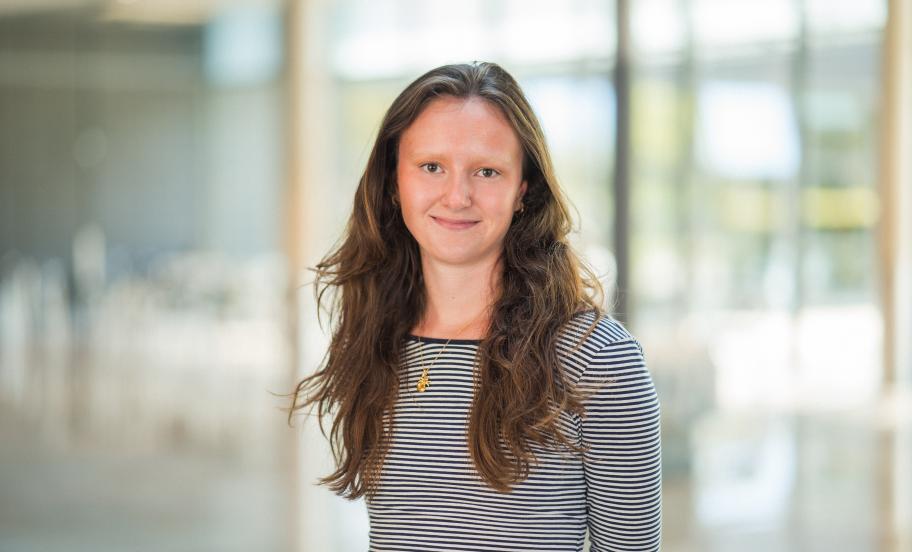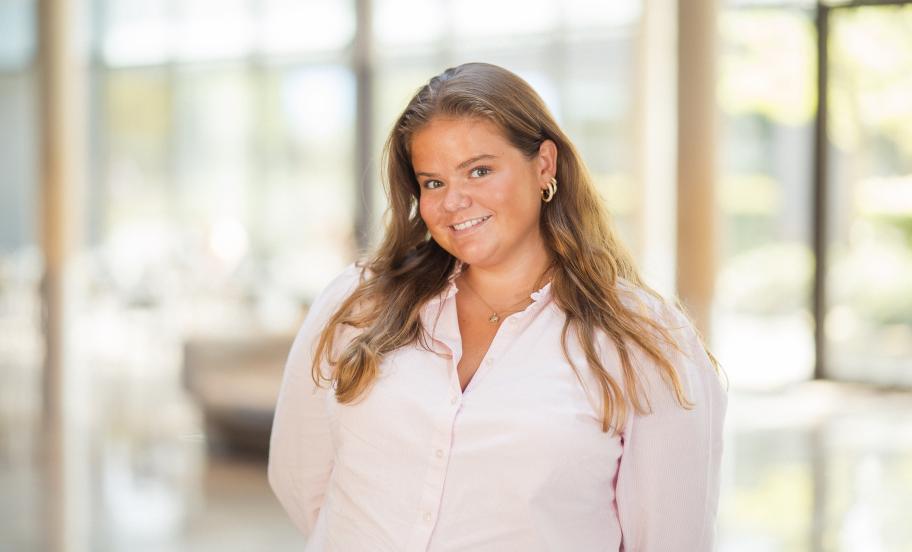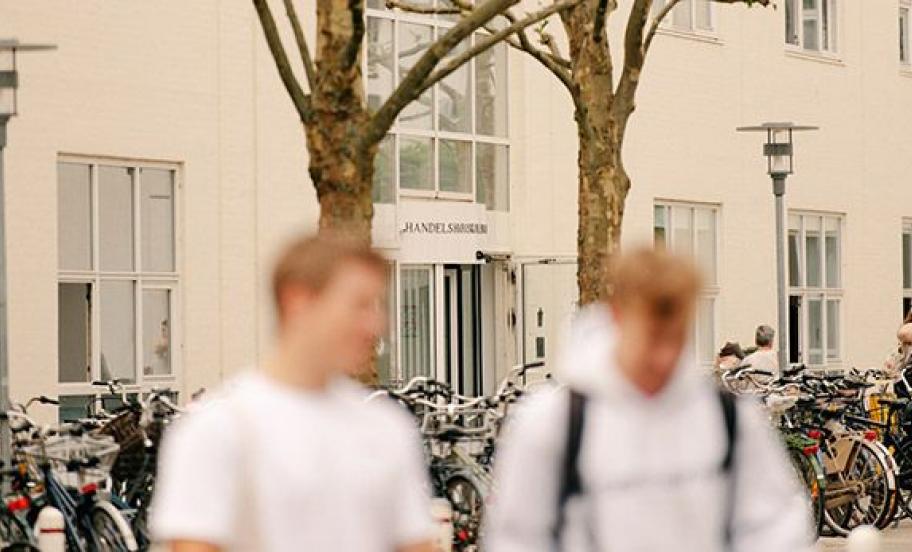BSc in Business Administration and Digital Management
BSc DM gives you an understanding of the possibilities as well as challenges that digitalisation creates for companies. You will learn to work with strategy, data and technologies to manage digital transformations and business solutions.

About BSc in Business Administration and Digital Management
Why choose BSC DM?
HEAR ABOUT THE PROGRAMME
Get an insight into what BSc DM is all about and what you will learn during the programme.
Where business meets digital thinking
Digital technologies are reshaping how companies work, compete and create value. From AI and data analytics to social media and e-commerce platforms, businesses need to think digitally in everything they do. On BSc DM, you learn how to navigate this complexity and use digital tools and data to make better decisions and develop responsible strategies for digital transformation.
Work with data
Companies gather vast and complex datasets, and you will learn how to collect, organise and analyse this data. You will use it to uncover insights into customer behaviour, market trends and operations, helping businesses make better, data-driven decisions.
Working responsibly with tech
You will also dive into key topics such as data privacy, regulation and ethics, learning how to use technology securely, fairly and effectively. You will explore how digital technologies - like AI, algorithms and automation - are shaping the world around us, in business and in social life.
Make information work for the business
You will work with how information is managed and shared in companies. You will also learn how digital tools and the flow of information shape how companies communicate, make decisions, and create value — both within companies and with external partners.
STUDENTS SHARE THEIR INSIGHTS
Thomas, Vera and Tobias share their thoughts about BSc DM.
Managing change in a digital world
Digitalisation and innovation drive change in organisations and societies. To understand this impact, you need to know how companies are structured and operate, and how change affects businesses, employees and society. You learn how to manage change and improve processes - such as introducing new digital tools in ways that support employees or helping teams adapt to new systems. The goal is to ensure that technologies are not only adopted but also create real business value.
Understanding business to create value
Digitalisation only creates value when it supports the company’s strategy. That is why you will learn how organisations work and how they are influenced by trends and changes in society.
You will gain a general understanding of business administration, such as marketing and finance. This way, you understand how digital platforms are reshaping marketing strategies or how analytics are used in financial planning.
Digital thinking is a business skill
BSc DM helps you see where digital tools truly make a difference and when they do not. You learn to weigh benefits, costs and risks, and to see how data, platforms and automation can improve decisions and efficiency. Digital thinking becomes a skill you can use to improve your ability to think critically about your decisions and act responsibly in business and society.
Come to Open Days
Visit us for Open Day and learn more about which programmes might be the right fit for you. You can also meet our students and talk to our staff.
We look forward to seeing you!

Structure
Economics and mathematics
Digital technologies change the ways in which businesses function, cooperate and compete in an often-international environment. To understand how digital technologies affect businesses you will need to become adept in economics, accounting and finance while also understanding significant market transformations caused by digitalisation.
IT and technology
At BSc DM, you will learn how digital technologies reshape virtually all aspects of doing business in the 21st century. We focus on the relationship between digital transformations and management, considering both the promises and limits of new technologies and data-driven approaches for contemporary organisations.
Organisation and management
An important issue facing managers is how to manage and facilitate digital transformations within organisations. At BSc DM, you will gain insight into the realities of – and potential difficulties associated with – leading organisation-wide transformations in ways that ensure employee motivation and commitment.
Culture and society
The rise of digital technologies affects not only businesses and other organisations but also society as a whole. At BSc DM, we place the organisation in a larger socio-political context both affected by and affecting the conditions for digital management (e.g. through changing regulation).
Programme overview
1st semester
2nd semester
3rd semester
4th semester
5th semester
6th semester
Options during the programme
Electives
On the 5th semester, you can choose to select courses that support your specific interest. CBS offers a large number of electives within a wide range of topics. You can also choose to take electives at other Danish universities. The electives you choose have to be relevant for your programme.
See the current selection of CBS electives on courses at bachelor level.
Exchange
Many students choose to go on exchange on their 5th semester; usually at one of CBS’ more than 300 partner universities. When you go on exchange through CBS, you do not have to pay for the teaching at the foreign university (with a few exceptions), and you can bring your SU (student grant).
Find a list of all CBS partner universities here.
Internship
You can substitute some of your electives with a so-called academic internship. The academic internship consists of a working period in a company which is completed with a project report. The internship can take place either in or outside of Denmark.
An academic internship gives you the opportunity to reflect on and apply the theory that you have learn at CBS to real cases. Your assignments during the internship and the subject of the project report must therefore be relevant to the programme you are studying.
Come to Open Days
Visit us for Open Day and learn more about which programmes might be the right fit for you. You can also meet our students and talk to our staff.
We look forward to seeing you!

Study environment
Social study environment
You will begin the programme alongside around 180 other students in BSc DM. You will get to know many of your fellow students through your assigned exercise class and through mandatory group work. The students are very social, and you often see them around campus—studying at the library or having a coffee at the student café Nexus.
Active student organisation
DM Union—the student organisation for DM students—hosts both social and academic events to help you connect, collaborate, and have fun. Join everything from quiz and board game nights, to bowling and machine learning workshops. This gives you an opportunity to get to know your fellow students in your own and other cohorts.
Read more about student life at CBS.
WHAT DO THEY THINK?
Learn how Thomas, Vera and Tobias and experience their student life on BSc DM
Meet the students
Teaching and exams
Teaching activities
You will have lectures with your whole year and smaller exercise classes. In the lectures, you are introduced to the theories and models you need to learn. In the exercise classes, you will work more hands-on with solving assignments and applying what you have learned on a case study.
Group work
In some of your mandatory courses, you will work on larger projects with a study group. During your first semester, you will be assigned to a group, but after that, you can choose your own group members.
Read more about teaching and working methods.
Exams
You will encounter different types of exams, such as written sit-in exams, larger projects, and oral exams. Many of your exams will be written projects that you submit - some of which you will also defend orally. Some projects are handed in individually, while others are completed in groups.
Read more about exams at CBS.
Time consumption
Workload
Pursuing a bachelor degree is demanding, and the curriculum and workload are much greater than what you experienced in your upper secondary education. So, you should expect spending approximately 37 hours on average on your studies each week.
Busy periods
The workload will vary during the year. The time leading up to assignment submissions and exams can be hectic, and you can easily work more than 40 hours a week in this period. Preparing for oral exams can be especially time consuming, because you have to be able to explain and discuss the covered concepts and theories and learn things by heart.
Read more about teaching and working methods
Student job
Most programmes are quite flexible in terms of combining studies with a student job. Most students work a maximum of 15 hours a week in order to have sufficient time for their studies.
Studying in Denmark - for internationals
If this is your first time studying in Denmark, you may find teaching and exam formats, the grading scale and the academic calendar very different from what you are used to.
Read about everything you need to know as an international student studying at CBS at Internationals students
Come to Open Days
Visit us for Open Day and learn more about which programmes might be the right fit for you. You can also meet our students and talk to our staff.
We look forward to seeing you!

Entry requirements
Language requirement: A
Challenges and considerations
WHAT YOU SHOULD CONSIDER
Our student guidance counsellor talks about the challenges on BSc DM and what you should consider before applying.
Academic challenges
Interdisciplinary courses
All courses in the programme are highly interdisciplinary and integrated. This can be challenging, as it requires you to think in complex ways - juggling both business and technology topics at the same time.
It also means that it might take time before you see how everything connects. Often, it’s not until your second or third year that the bigger picture starts to come together and you fully understand how the different courses and topics relate to each other and to the overall scope of the programme.
Grade-free first semester
You will not receive grades during your first semester. Instead, you will get feedback on your exams, which are assessed as pass/fail. This allows you to focus on learning and collaboration with your fellow students rather than just performing well in your exams.
Maths as a tool
In about a third of the mandatory courses in BSc DM you will use maths as a tool. You will not use maths that is complicated beyond the entry requirement for the programme, but you need to be comfortable having courses where you use maths and do calculations at a practical level.
Studying in English
If you are not used to studying in English or if you are not a native speaker, we recommend that you read more about what to consider before applying for an English-taught programme.
Read more here.
WHY THEY CHOSE BSC DM?
Hear what Thomas, Vera and Tobias considered before applying for BSc DM
In need of special support?
Do you have a disability such as dyslexia, anxiety, autism, ADHD, long-term effects of concussion or another physical, psychological or neurological disability?
Then you have the opportunity to apply for Special Educational Support (SPS) and special conditions while studying.
This ensures you can study on equal terms with your fellow students.

Apply for admission
Info meeting about admission
Join an info meeting about admission where we guide you through the admission process and explain about Quota 1 and Quota 2, how to fulfil the entry and language requirements, and much more.
Come to Open Days
Visit us for Open Day and learn more about which programmes might be the right fit for you. You can also meet our students and talk to our staff.
We look forward to seeing you!

Admission in numbers
After the programme
Master's degree after BSc DM
The majority of students from BSc DM continue on to a two-year master programme, making it a total of 5 years of studies.
It is very much the master rather than the bachelor programme that shapes your future career opportunities.
After graduating from BSc DM, you are guaranteed a place in the natural progression: MSc in Business Administration and Digital Business
What you learn
Career
Most BSc DM graduates go straight into a master programme after finishing their bachelor. Later, they typically work in a range of industries or departments, such as
- Product development
- IT project management
- Data analytics
- Innovation & R&D
- Consulting
- E-commerce and retail
Tasks can vary a lot, but specific examples are:
- Analysing data to uncover trends and support informed business decisions.
- Coordinating digital transformation projects across teams and departments.
- Designing customer journeys and enhancing digital user experiences.
- Evaluating and implementing digital tools to improve workflows and efficiency.
- Contributing to the development and optimisation of digital products or services.
- Supporting organisational change and helping teams adapt to digital solutions.
YOUR OPTIONS AFTER BSC DM
Our student guidance counsellor talks about what options you have after graduating from BSc DM
Come to Open Days
Visit us for Open Day and learn more about which programmes might be the right fit for you. You can also meet our students and talk to our staff.
We look forward to seeing you!

More about BSc in Business Administration and Digital Management
BSc DM gives you an understanding of the possibilities as well as challenges that digitalisation creates for companies. You will learn to work with strategy, data and technologies to manage digital transformations and business solutions.
Related master programmes
Other bachelor programmes
Curious about similar study programmes? You may find other study programmes that also match your interests and dreams for your career.














